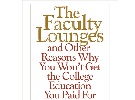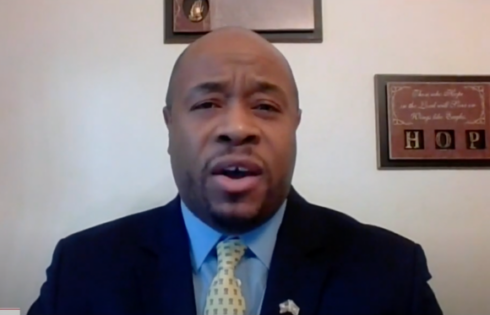
A number of educators, policy experts, and entrepreneurs are criticizing American higher education for producing college degrees that aren’t worth the cost. One skeptical entrepreneur, PayPal founder Peter Thiel, is even awarding $100,000 grants to enterprising young people who agree to skip college and pursue research and innovation instead.
To the growing list of higher ed critics, add Naomi Schaefer Riley, author of The Faculty Lounges: And Other Reasons Why You Won’t Get the College Education You Pay For. In her book, Riley takes aim at the tenure system, which guarantees positions for select senior faculty members. Though a common feature of academic life at most American universities, tenure makes for poor teachers—to the extent that Riley described her book as “an extended case against tenure.”
“Tenure privileges research over teaching, and I think that’s become a real problem for creating quality undergraduate education,” she said.
Riley notes that good teachers need constant re-evaluation to remain top-notch at what they do. But tenure, by virtue of being permanent, removes many of the incentives for teachers to brush up on their profession.
Tenure has also entrenched university faculty in their positions—to the detriment of reform.
“It’s given the faculty a stranglehold on power at the university,” she said. “All of the reforms we’re discussing right now, whether it’s trying to control the cost, or trying to change the politics, or have more intellectual diversity, or change the curriculum, any of these things are prevented from happening by tenure because the faculty will always win the battle. They will always be around the longest, longer than administrators, longer than regents, longer than the president, longer than the parents, and certainly the students.”
Those who defend the tenure system often invoke it as a way to safeguard intellectual freedom on campus. Professors may have to compromise their views while they wait, but once their positions are tenured, they will start speaking their minds. Riley has heard this argument; she just doesn’t buy it.
“Right now it could take you ten years to get a PHD and another ten years to get tenure,” she said. “So by the time you wake up and you’re forty-something, are you suddenly after all this time going to start speaking your mind? My guess is probably not.”
As for evidence, she points to the existing academic climate on campus.
“If you look at the intellectual uniformity that’s been created by the current system, you wouldn’t say tenure has done a very good job,” she said.
But tenure is just one of Riley’s concerns about universities. Another is the kind of education they provide.
Two experts, Richard Arum and Josipa Roksa, recently examined to what degree universities succeed in educating their students. Their book, Academically Adrift, showed that large numbers of students do not become measurably smarter during the course of college. After two years, 45% of students tested showed no improvement. After four years, 36% still had not improved.
For Riley, the problem is due in part to the fact that many high school graduates are not ready for introductory college courses, despite high grades.
“Higher education is remedial education,” she said. “People are increasingly realizing that colleges are just doing what high schools were supposed to do.”
But, as Riley points out, trying to catch these students up is much more costly at the college level.
“For obvious reasons, it costs more to educate people in remedial education in a college setting than it does in a high school setting,” she said. “If you want to teach someone basic English composition, reading twice a week for a couple of hours is probably not the best way to do that.”
This has policy ramifications. Education experts in the Obama administration frequently repeat the president’s pledge to boost the college graduation rate to 90% by the end of the decade. Riley thinks that’s wishful thinking. Too many students lack proficiency in high school-level education as it is.
“When the Obama administration talks about greater access to higher education, I just translate that into greater access to what we used to think of as high school education,” she said.
As for skipping college to accept $100,000 grants, Riley thinks many of the Peter Thiel Fellowship recipients made a smart deal for the time being.
“If you went to a good high school, and you’re already doing lots of good computer coding, what does a college education have to add for you?” she said. “Now, I think that a good college education could justify itself. But if you’re just going to college for the credential and you’re already in a position like the Thiel Fellows, then I don’t think you need that credential at all.”
Like The College Fix on Facebook / Follow us on Twitter





Please join the conversation about our stories on Facebook, Twitter, Instagram, Reddit, MeWe, Rumble, Gab, Minds and Gettr.